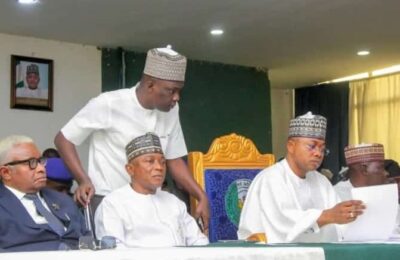By Dan Amor
Even as analysts have argued that the sudden death of the candidate of the All Progressives Congress (APC) in the November 2015 Kogi State governorship election, Prince Abubakar Audu while he ‘was coasting home to victory’ has exposed a constitutional lacuna in our electoral system, the Kogi conundrum remains the only viable thermometer to gauge the tempo of our nascent democracy. Those who think that the crisis triggered by the death of Audu and the surreptitious declaration of the election as inconclusive by the Independent National Electoral Commission (INEC) is over are swimming in illusion of grandeur. It was indeed, foolhardy on the part of the APC not to allow Prince Audu’s running mate, Hon. James Faleke (who is even claiming dual citizenship of Lagos and Kogi states at the same time) to continue with their joint ticket in the supplementary poll in the 91 units where elections were cancelled. Probably God allowed it to happen in other to teach the party a lesson for its brazen lawlessness and arrant impunity at high noon.
Now that it is morally sequestered that Audu died with his votes, as there had been no such precedent in our constitutional cum electoral history or anywhere in the world, it is only logical that the candidate that scored the highest votes after Audu be declared winner of the election. The substitution of Audu by Alhaji Yahaya Bello was just an irresponsible ploy by the APC to postpone the evil day having known that votes are not transferable anywhere in the world.
The substitution of Audu with Bello has made the APC’s ship as far as the Kogi conundrum is concerned, to even sink much deeper. If it is true that Bello didn’t register and didn’t even vote during the first election, it is obvious he cannot be voted for. In effect, his vote is null and void. It is time now for operators in the system to correct themselves as there is nothing wrong in summoning the political will to declare Governor Idris Wada, the proper person as winner. It is a question of having the leverage to declare the right person as winner. The tenet of the Electoral Act is clear: you cannot be voted for if you are not qualified. Again, if votes are transferable, why is it that in the several instances whereby people elected into states or National Assemblies are dead, their positions are not automatically taken over by substituted members of their respective political parties? The Kogi controversy is an unfortunate creation of the ruling APC at the centre which is desperate to turn Nigeria to a one-party state and rule in perpetuity. Like a roaring lion, the APC, since savouring the allure of its victory in the March 28, 2015 Presidential election, has been seeking for which state to devour thereby manifesting the worst form of illegality, openly mentioning states that they would capture and disobeying court orders with arrogance. Very disappointing is the fact that those whose voices are supposed to be heard are cowed into mitigated silence and submission even as the ruling party is doing everything possible to arm twist the judiciary.
It is indeed the duty of the judiciary as the safety valve or sole arbiter of the common man, to promote the growth and stability of this democracy and the unity of the country. For instance, in the history of democratic development of the United States of America, the Supreme Court, especially under the leadership of Earl Warren, led a judicial revolution that reshaped many social and political relationships in that enviable country. The Warren Court had often plunged the US into bitter controversies as it decreed an end to publicly-supported racial discrimination, banned prayers in public schools, and extended constitutional guarantees to blacks, the poor, Communists, and those wrongly detained by the police.
Warren was a symbol of progressive change, the spirit of much that happened in his country during his time at the American Supreme Court as his radical actions turned to be a redeeming mission for his country. Imagine what a Gani Fawehinmi would have done in Nigeria were he to be appointed Chief Justice! Yet, it is lamentable seeing otherwise brilliant lawyers who claim to be adherents of Gani’s jurisprudential camp keeping mute in the face of the bizarre going on in Kogi as a result of the manipulation of INEC by the ruling party at the centre in its ambition to rule the state at all costs.
All said, the APC should see in the Kogi debacle an unflattering commentary about its capacity for political direction and leadership in the country. It has yet to nurture in its membership the requisite temperament and orientation for implantation of civil, democratic ethos. Which is indeed unfortunate. If lawyers and members of the civil society do not wake up from their slumber and defend this democracy with all that is required, our country would slide into a totalitarian state. Currently, the Federal might has taken over the responsibility of determining what the law is regarding any issue while the courts are left to issue orders that are selectively and paternalistically obeyed, if at all.
The unambiguous judgment of the Appeal Court in the Taraba State governorship election tango has manifestly made it clear that the entire claim of the APC in that state as sanctioned by the lower tribunal was built on the shifty sand of serial illegalities and that Governor Darius Dickson Ishaku of the PDP remains the duly elected governor of Taraba state. This commendable gesture has done a devastating blow to the unjust and cascading judicial rascality of most of the state election tribunals. But it must not end there. The judiciary must assert itself and save Nigeria from impending doom.
It is posited that push has turned to shove and the Federal Government has been providentially handed a golden opportunity to demonstrate its commitment to the constitution and the rule of law. The ruling party must also tame its swagger not only in Kogi but also in Bayelsa, Rivers, Akwa Ibom and others for the peace and development of this country. What Nigerians have witnessed so far in the seven months of its presidency amounts to a flagrant abuse of the democratic process as though it exists to frustrate genuine democratic practice in the country.
Such unbecoming acts and utterances like the type recently credited to the APC national chairman, Chief John Oyegun, that the party must take Rivers and Akwa Ibom, represent a clear and present danger to the constitutional democracy that Nigerians embraced with such great hopes and expectations. In fact, if we deprecated with vehemence the murderous fancy and I-know-it-all bravura of the Obasanjo dictatorship between 1999 and 2007, what do we say of the magnitude of impunity and disobedience of court orders exhibited with ubiquity and constancy by the Buhari presidency in just seven months? They must be nipped in the bud as they threaten the peace, stability and corporate existence of our beloved country.
Even intra-party intrigues have made nonsense of the concept of party politics in Nigeria. In the absence of properly constituted political parties, which inculcate in their members a clear philosophical-cum-ideological orientation as well as a sense of loyalty to a strong organisational structure anchored on disciplined esprit de corps, the woes currently bedeviling the political system are almost inevitable. The parties were hurriedly cobbled together to meet deadlines set by the military transition. Because of the essentially loose electoral alliances, strange bedfellows were expected to co-habit presumably in some peace. The recent merger of some political parties to form the APC ostensibly to capture political power from the PDP followed the same pattern. The co-habitation has clearly not been harmonious.
It may sound pedantic but well-meaning Nigerians are obliged to warn INEC against the dire consequences of a failure to swear in Idris Wada as the legitimate governor of Kogi state for his second term. Most of the problems that are confronting the polity today are traceable to the corrupt nature of the emergence of our rulers. The legitimacy of any government and its ability to galvanize the citizenry towards its policies is directly dependent on the credibility of the election through which it accedes to power. A stitch in time saves more than nine!
•Amor is an Abuja-based journalist and public affairs analyst.




